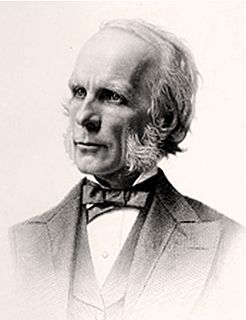A Quote by John Owen
To those to whom Christ is the hope of future glory, he is also the life of present grace.
Related Quotes
The Kingdom of grace is nothing but.... the beginning of the Kingdom of glory; the Kingdom of grace is glory in the seed, and the Kingdom of glory is grace in the flower; the Kingdom ofgrace is glory in the daybreak, and the Kingdom of glory is grace in the full meridian; the Kingdom of grace is glory militant, and the Kingdom of glory is grace triumphant.... the Kingdom ofgrace leads to the Kingdom of glory.
Believers know that the presence of evil is always accompanied by the presence of good, by grace... Where evil grows, there the hope for good also grows... In the love that pours forth from the heart of Christ, we find hope for the future of the world. Christ has redeemed the world: "By his wounds we are healed." (Isaiah 53:5)
Christians do not practically remember that while we are saved by grace, altogether by grace, so that in the matter of salvation works are altogether excluded; yet that so far as the rewards of grace are concerned, in the world to come, there is an intimate connection between the life of the Christian here and the enjoyment and the glory in the day of Christ's appearing.
In Buddhism, we speak of touching Nirvana with our own body, In Christianity, you can also touch the Kingdom of God with your body, right here and now. it is much safer than placing our hope in the future. If we cling to the idea of hope in the future, we might not notice the peace and joy that are available in the present moment. The best way to take care of the future is to take care of the present moment.
My concern today is with the painting of manners of the present. The past is interesting not only by reason of the beauty which could be distilled from it by those artists for whom it was the present, but also precisely because it is the past, for its historical value. It is the same with the present. The pleasure which we derive from the representation of the present is due not only to the beauty with which it can be invested, but also to its essential quality of being present
The only man who has the right to say that he is justified by grace alone is the man who has left all to follow Christ. Such a man knows that the call to discipleship is a gift of grace, and that the call is inseparable from the grace. But those who try to use this grace as a dispensation from following Christ are simply deceiving themselves.
There is a warning here for true pilgrims. Beware of the talker, but also be careful not to judge too quickly those whom God has blessed with both genuine grace and a fluency to speak of divine mercy in ways more eloquent than others. The proof is in the life-not a perfect life, but a life that both delights in divine truth and magnifies God, the only giver of the sovereign grace that always produces the truly fruitful, fragrant life.
The proclamation of grace has its limits. Grace may not be proclaimed to anyone who does not recognize or distinguish or desire it... The world upon whom grace is thrust as a bargain will grow tired of it, and it will not only trample upon the Holy, but also will tear apart those who force it on them.
by grace ye are saved, not of works,' but by the will of God through Jesus Christ . . . If we please Him in this present world, we shall receive also the future world, according as He has promised to us that He will raise us again from the dead, and that if we live worthily of Him, 'we shall also reign together with Him,' provided only we believe . . .
The ultimate difference between God's wisdom and man's wisdom is how they relate to the glory of God's grace in Christ crucified. God's wisdom makes the glory of God's grace our supreme treasure. But man's wisdom delights in seeing himself as resourceful, self-sufficient, self determining, and not utterly dependent on God's free grace.
Blessed, plainly, is that life which is not valued at the estimation of outsiders, but is known, as judge of itself, by its own inner feelings. It needs no popular opinions as its reward in any way; nor has it any fear of punishments. Thus the less it strives for glory, the more it rises above it. For to those who seek for glory, that reward in the shape of present things is but a shadow of future ones, and is a hindrance to eternal life, as it is written in the Scriptures: 'Truly I say to you, they have received their reward'




































